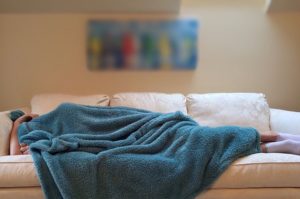For those with diabetes, the body doesn’t produce enough insulin or doesn’t use insulin effectively, causing excess glucose levels in the bloodstream. The most common types of diabetes are type 1 and type 2. With type 1 diabetes, the pancreas doesn’t produce enough insulin, so external sources of insulin must be taken on a daily basis. With type 2 diabetes, the body is able to make insulin but either cannot make enough or cannot use it in the way that it’s supposed to.

Short-term symptoms of both types of diabetes include things like excessive thirst or hunger and frequent urination. Excessive glucose levels in those with type 1 and type 2 diabetes can cause long-term health complications, and can impact everyday routines like sleep.
How Diabetes Interacts with Sleep
A 2012 study found a clear relationship between diabetes and sleep disturbance. Researchers working on the study explained that this goes both ways: diabetes can cause people to lose sleep, and conversely losing sleep can complicate diabetes management.
Certain diabetes symptoms are more likely to cause sleep issues. If blood sugar levels are not controlled and become too high, it can cause frequent urination. This can affect sleep patterns throughout the night. High glucose levels can also make people feel more thirsty and cause the need to get up and consume water. On the flip side, low blood sugars can cause feelings of shakiness, dizziness, or sweat, which can also affect sleep.
Sleep Disorders Associated With Diabetes
There are certain sleep disorders that those diagnosed with diabetes can experience. These include:
Sleep Apnea
Sleep apnea is a common disorder among individuals with type 2 diabetes. This disorder causes breathing to randomly stop and restart again throughout the night. A 2009 study of type 2 diabetes sufferers found 86% of those who participated had sleep apnea. Sleep apnea can often be caused by air passages being constricted due to weight. Patients with type 2 diabetes sometimes struggle with weight issues and this can contribute to experiencing sleep apnea.
Restless Leg Syndrome
Restless leg syndrome (RLS) is a disorder that causes a constant urge to move the legs. This can be especially problematic during nighttime and cause disrupted sleep habits. High blood sugar levels and iron deficiency are two known risk factors for RLS.
How to Improve Your Sleep with Diabetes
If you have been diagnosed with diabetes and are experiencing sleep issues, there are a few steps you can take to improve your sleep patterns.
Managing Blood Sugars: The ability to manage diabetes symptoms can help resolve sleep issues. Using modern tools such as an insulin pump with continuous glucose monitoring can assist with keeping glucose levels consistent. Some newer insulin pumps even have smartphone-style touchscreen interfaces, making them simple to see and navigate at night. Using readings to make decisions about insulin delivery and having the ability to share data with doctors can allow professionals to help understand why an individual may feel groggy or fatigued throughout the day. This can assist in formulating a diabetes treatment plan that can achieve optimal health for the individual.
Eating Healthier: If you’re not getting great sleep, basic lifestyle changes can make a great impact. Healthy eating habits can help keep blood sugar levels manageable and keep symptoms at bay.
Losing Weight: Studies have shown that people who get less sleep tend to be heavier than those who sleep well. Losing weight through both healthy diet and exercise can have a positive effect on the symptoms of Type 2 diabetes, as well as sleeping patterns.
Maintaining healthy habits and keeping track of diabetes symptoms is an important part of managing day-to-day life with diabetes. While sleep can both affect and be affected by diabetes, sleep routines can be influenced by many things. An effective diabetes management plan can help ensure healthy habits, day or night.
SOURCES:
https://www.healthline.com/health/diabetes/diabetes-and-sleep
https://www.webmd.com/sleep-disorders/features/diabetes-lack-of-sleep#1
http://care.diabetesjournals.org/content/32/6/1017
https://www.webmd.com/diabetes/type-2-diabetes-guide/type-2-diabetes-sleep#1



Leave a Reply